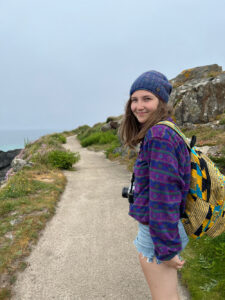 Andie Mollins just finished Boot Camp. It’s no surprise she’s a bit drained after eight weeks of the one-year Bachelor of Journalism’s non-stop, deep dive into research, writing and reporting across all media. But she’s also exhilarated, excited.
Andie Mollins just finished Boot Camp. It’s no surprise she’s a bit drained after eight weeks of the one-year Bachelor of Journalism’s non-stop, deep dive into research, writing and reporting across all media. But she’s also exhilarated, excited.
“I’ve found my career,” she exclaims. “It’s just so wonderful that as a journalist I’m going to have a career where I get to connect with the world.” Mollins loves the program’s small classes and the students’ diversity in age and background. “We’re learning to produce content for the world, and we have the world in our classes.”
Some students have their education and career path fully mapped. Others, like Mollins, as she says about herself, kind of “go with the flow.” The recipient of this year’s River Philip Foundation Journalism Scholarship, Mollins has been more inclined to trust her instincts and her interests as they’ve taken her from a small-town upbringing in Shediac, New Brunswick, to a B.A. in History and Sociology at UNB Fredericton with a senior year at the University of Birmingham in Britain, and now, King’s School of Journalism Writing & Publishing.
Achievements aside, Mollins says she’s always been shy, an assertion that can feel a little out of sync with her enthusiasm for the program and her newfound career path. And it wasn’t athletic prowess, she says, that led her into cadets, marksmanship and biathlon (shooting while skiing!) where she competed nationally with her team. “I just had a lot of energy to get rid of,” she laughs.
Over time, Mollins has amassed the kind of skills and interests that are going to serve her well as a journalist. Thanks to 13 years of French school and her Acadian mother who insisted they speak French at home, she’s bilingual. And since childhood she has been, by nature, something of an observer. “When I was eight years old my grandfather gave me a camera. I fell in love with taking pictures, mostly simple objects and landscapes but later, of people. I photographed everyone waiting around reading their books and killing time at competitions. I loved sharing my photographs. I still do.”
It was studying history along with gender and women’s studies at UNB that awakened the passions that drive Mollins now. “I became fascinated by how we ended up where we are now, how discrimination developed. I studied the history of slavery and racism and how we developed the concept of disabilities.” At the University of Birmingham, she explored the history of sexual and gender minorities in Britain.
Sharing, connecting with the world…for Mollins, journalism will be the way she shares what she learns and loves and creates. “There’s no other job I would want to do,” she exclaims. “It will allow me to research things and write about them or talk about them. I can pick up my camera or make a video. I’ll get to share my community, the world around me and in that sense, share my life.”
Coming out of Boot Camp, it’s radio that has Mollins enthralled. “I like writing but I’m loving communicating through radio. It feels so much more personal than print. You can really connect with your listeners,” she explains. She credits renowned Canadian journalist Pauline Dakin, who teaches the audio workshop, with fostering her enthusiasm. “She’s such a calm, wise presence. She’s really supportive and makes us believe we can do it. She gives us her trust.”
“We’re learning to produce content for the world, and we have the world in our classes.”
A longtime fan of podcasts, Mollins can now envision someday producing and hosting her own. “If I were doing them today I would have conversations about justice…exploring the things people experience that feel out of their control and the potential solutions and innovative policies that could be put in place to make the world better. I’d explore gender issues, feminism and racism, and help expose accepted realities for what they are – social constructs. I’d like to encourage people to think more critically when it comes to sex and gender and to reflect on why defying gender norms makes them uncomfortable. And beyond a uniquely feminist perspective, I want to create work that addresses issues such as poverty and homelessness, climate change, and the genocide of Indigenous Peoples in Canada.”
Asked to expand on her interest in gender issues, she pauses. “I feel like growing up in a small town I was surrounded by people, myself among them, who had little exposure to different perspectives. Growing up I just accepted certain things, like many of the people around me seemed to do. There wasn’t a lot of overt sexism but there were – and still are – so many microaggressions around. But I didn’t fully recognize it then. As a woman or a girl there are a lot of moments when you feel kind of humiliated and you bury it. I know that, as a journalist, I can generate more awareness and some meaningful discussion, and hopefully help others see that they deserve to be heard and respected.”

